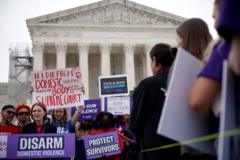In a landmark decision, the Supreme Court has ruled that individuals placed under restraining orders for domestic violence do not have a right to own guns. The 8-1 decision upholds a 30-year-old law that prohibits those with restraining orders for domestic abuse from possessing firearms.
The case at the center of this ruling involved Zackey Rahimi, a Texas man who was indicted under the 1994 law but filed an appeal after a 2022 Supreme Court ruling expanded gun rights. The court’s previous decision recognized the broad right to carry a handgun outside the home for self-defense and established a new test for gun laws, requiring them to be rooted in “historical tradition.”
Rahimi’s lawyer, James Matthew Wright, argued during a November hearing that there was no historical precedent for disarming individuals under restraining orders, except for those convicted of a felony. He contended that restraining orders did not meet the new test set by the court.
The US government, seeking to maintain the law, presented its case by highlighting historical instances where “dangerous” individuals, such as loyalists to Britain during the American Revolutionary War era, were disarmed. The government’s lawyer also emphasized that women living with an armed domestic abuser were five times more likely to be murdered.
Zackey Rahimi, a 23-year-old small-time drug dealer, is currently serving a six-year sentence in a Texas federal prison. He is also awaiting a state trial. In 2020, Rahimi’s then-girlfriend obtained a restraining order after he physically assaulted her during an argument, causing her to hit her head on the dashboard of his car. He also fired shots at a bystander who witnessed the assault. Despite the court order suspending his handgun license and prohibiting him from possessing firearms, Rahimi retained his weapons and was involved in five public shootings later that year.
Chief Justice John Roberts delivered the court’s opinion, stating that when a restraining order identifies an individual as a credible threat to the physical safety of an intimate partner, that person may be banned from possessing firearms in accordance with the Second Amendment. Roberts emphasized that throughout the nation’s history, firearm laws have included provisions to prevent individuals who pose a threat of physical harm from misusing firearms.
Justice Clarence Thomas, the sole dissenter among the nine judges, held a conservative viewpoint on the matter.

